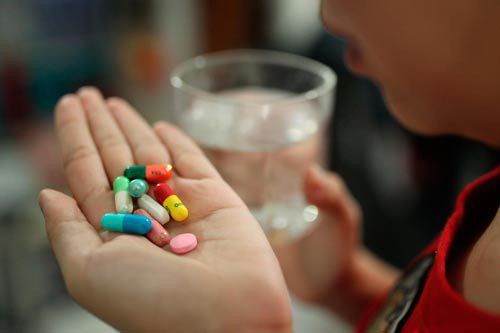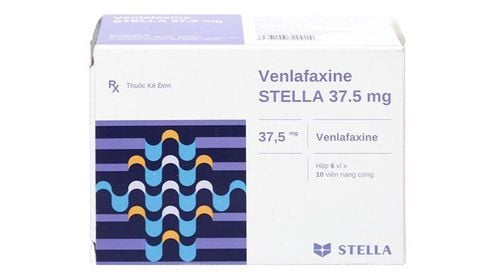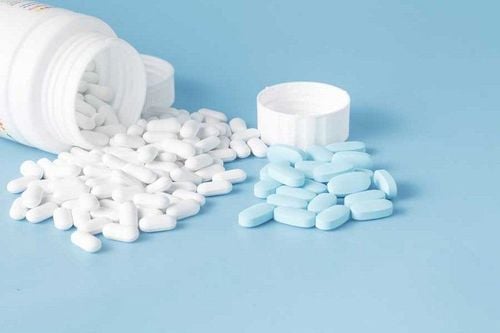This is an automatically translated article.
Many people still wonder about the use as well as the usage and effects of Venlafaxine. The following article will provide readers with some information about this drug.
1. What are the effects of Venlafaxine?
Venlafaxine is a phenylethylamine-derivative antidepressant belonging to the class of serotonin and noradrenaline reuptake inhibitors. Venlafaxine is well absorbed orally; food may slow absorption but does not affect the extent of absorption. After oral administration, the drug undergoes first-pass metabolism in the liver, mainly to the active O-desmethylvenlafaxine (ODV). Venlafaxine is eliminated mainly in the urine as metabolites and only 2% in the faeces. The drug is available in the form of tablets or capsules with different strengths. Venlafaxine may be indicated for the treatment of the following conditions:Depression . Social anxiety disorder, generalized anxiety disorder,. Other anxiety disorders such as phobia-impulse, panic disorder or post-traumatic stress.
2. What are the contraindications of Venlafaxine?
Venlafaxine antidepressant should not be used in the following cases:
Hypersensitivity to Venlafaxine or any of its ingredients. Cases with high risk of arrhythmia, uncontrolled hypertension. Concomitant use with MAO inhibitors. Pregnant. Children under 18.
3. Dosage of antidepressant Venlafaxine
In case of depression: For adults and children over 18 years old (fast-acting tablets) with a starting dose of 75mg/day divided 2-3 times with meals (some patients can take Initially lower than 37.5 mg/day for the first 4-7 days then gradually increase to 75 mg/day), if necessary the dose can be increased to 150 mg/day after several weeks to achieve therapeutic effect. The maximum dose is 225 mg/day. Severe depression or hospitalization: May start with up to 150mg/day, after 2-3 days can increase by 75mg/day to a maximum dose of 375mg/day. Then gradually reduce the dose. Treatment of anxiety states: Administer extended-release tablets at a starting dose of 75 mg once daily (in some cases, a low dose of 37.5 mg/day may be initiated for the first 4-7 days). , then increase the dose to 75 mg/day). Increase dose gradually every 4 days to a maximum dose of 225 mg/day. Stop the drug gradually if there is no good response after 8 weeks of treatment. Treatment of panic states: Use the extended-release formulation, starting at 37.5 mg/time/day for 7 days, then increasing to 75mg/time/day. The dose may be increased by 75 mg/day every 7 days until therapeutic requirements are achieved. The maximum dose is 225 mg/day. For patients with impaired liver/kidney function: Patients with hepatic impairment, mild renal impairment do not require dose adjustment. As for patients with liver failure, moderate renal impairment, the dose is halved and used once a day. Venlafaxine should not be used in patients with severe liver or kidney failure.

Người bệnh nên sử dụng thuốc Venlafaxine theo đúng liều lượng được chỉ định
4. Side effects of Venlafaxine
4.1 Common side effects Neurological: Dizziness, headache, insomnia, somnolence, weakness, nervousness, anxiety, agitation, nightmares. Cardiovascular: Vasodilation, tachycardia, palpitations, dose-dependent hypertension. Venlafaxine may cause an increase in blood pressure at doses exceeding 200 mg/day. Therefore, if the patient has had hypertension before, it is necessary to treat hypertension before taking venlafaxine, note that blood pressure must be checked regularly during treatment. In some cases, it is necessary to reduce the dose or stop the drug due to high blood pressure during treatment. Gastrointestinal: Dry mouth, nausea, vomiting, constipation, anorexia, dyspepsia, abdominal pain, diarrhea. Since food does not reduce the absorption of oral drugs, to reduce unwanted effects such as nausea and vomiting, the drug can be taken with food. Metabolic and endocrine: Weight gain or loss, increased cholesterol, sexual dysfunction. Allergies: Itching, skin rash, or even difficulty breathing Other signs: Feeling chills or feverish, increased sweating, increased urination, vision disturbances, muscle pain, arthritis, and ringing in the ears. 4.2 Uncommon side effects Cardiovascular: Postural hypotension, arrhythmia, tachycardia. Neurological: Speech disorders, extrapyramidal disorders, signs of hypomania, hallucinations, convulsions, fainting. If convulsions occur during treatment, the drug should be discontinued immediately, as convulsions may be an indication of an overdose. Liver: hepatitis, reversible increase in liver enzymes. Allergic reactions: Hypersensitivity, erythema multiforme, Stevens-Johnson syndrome, angioedema Other signs: Skin bruising, taste changes, menorrhagia, gastrointestinal bleeding, urinary retention, sensitivity with light. 4.3 Rare adverse reactions Blood: Hematopoietic disorders such as aplastic anemia, granulocytopenia, neutropenia, pancytopenia and thrombocytopenia Cardiovascular: QT prolongation, torsades de pointes , ventricular tachycardia, ventricular fibrillation Other: pancreatitis and pulmonary eosinophilia, increased lactation, rhabdomyolysis, hyponatremia, appearance of suicidal thoughts, especially in children.

Một số người bệnh có thể cảm thấy buồn nôn khi sử dụng Venlafaxine
5. Precautions when using Venlafaxine
Venlafaxine can cause many unwanted effects and many serious events if used in excess. Therefore, when using the drug, patients need to be especially careful and strictly follow the instructions of the doctor. Some notes when using the drug include:
Caution should be exercised when using Venlafaxine antidepressants for patients with moderate and severe impairment of liver and kidney function. Dosage must be adjusted according to the patient's liver and kidney function. For patients with cardiovascular disease: use with caution in patients with a history of recent myocardial infarction, unstable heart disease Epilepsy patients: Use with caution in patients with pre-existing epilepsy, Discontinue in any patient who develops seizures. Because of the risk of dose-dependent hypertension, blood pressure should be monitored during treatment when doses exceed 200 mg/day. It is recommended to monitor blood cholesterol levels if taking the drug for a long time. Caution should be exercised in patients with increased intraocular pressure or angle-closure glaucoma, in manic patients, or in patients with bleeding disorders. Patients with depression are at high risk of suicide and should be closely monitored during treatment, especially during the initial phase of drug therapy. Stopping the drug or reducing the dose suddenly may cause symptoms such as fatigue, headache, dizziness, drowsiness, nausea, loss of appetite, dry mouth, anxiety, nervousness, confusion, agitation, hypomania, increased sweating. Therefore, the dose should be reduced gradually for at least one week after a course of treatment lasting more than one week prior to discontinuation. At the same time, patients must be closely monitored to promptly handle adverse reactions when stopping the drug. For pregnant women: Venlafaxine and its active metabolite may cross the placenta. The use of venlafaxine near the due date of delivery may result in discontinuation reactions in the neonate. The manufacturer recommends that venlafaxine not be used by pregnant women unless absolutely necessary. For lactation: Venlafaxine and its active metabolite may be excreted in human milk. Because of the potential for serious adverse reactions in the nursing infant, the manufacturer recommends that a decision be made whether to discontinue nursing or discontinue the drug, considering the importance of treatment to the mother. When starting antidepressant medication in a nursing woman, drugs other than venlafaxine should be preferred. For people who often drive and operate machinery: Since Venlafaxine can cause dizziness, orthostatic hypotension especially in the elderly. Therefore, when using the drug, you should not drive a vehicle or operate machinery.
Interactions with other drugs: Some drugs when used concurrently with venlafaxine can cause many adverse reactions. For example, taking Venlafaxine together with serotonin agonists, selective serotonin reuptake inhibitors, serotonin reuptake inhibitors and noradrenalin, drugs that reduce serotonin metabolism can cause serotonin syndrome. If you must take venlafaxine concurrently with one of the above drugs, your doctor must closely monitor you, especially during the early stages of treatment. In particular, venlafaxine should not be used concurrently with MAO inhibitors, as life-threatening interactions may occur. MAO inhibitors must be discontinued at least 14 days before starting venlafaxine, and venlafaxine must be discontinued at least 7 days before starting another antidepressant. It is best to tell your doctor or pharmacist all the medicines you are taking for proper advice.

Người bệnh nên hỏi ý kiến bác sĩ trước khi dùng Venlafaxine
6. How to handle a missed dose or an overdose of Venlafaxine
6.1 Overdose and Treatment Venlafaxine overdose may cause symptoms including coma, somnolence, lethargy, dizziness, ECG changes, arrhythmias, tachycardia, and dilation death, convulsions, vomiting, hypotension or even death. Overdose with venlafaxine often occurs when patients use the drug with alcohol and/or other drugs that cause interactions.
How to handle overdose : There is no specific antidote for Venlafaxine overdose. When there are signs of poisoning due to Venlafaxine overdose, it is necessary to immediately bring the patient to medical facilities for timely emergency. The doctor may prescribe vomiting, use activated charcoal or gastric lavage if detected early. Treatment is mainly symptomatic treatment and respiratory support.
6.2 Missed dose and what to do If you forget to take a dose, take it as soon as you remember. However, if it is almost time for your next dose, skip the missed dose and take your next dose as scheduled. Do not take a double dose.
In summary, Venlafaxine is used in the treatment of depression and can cause a lot of unwanted side effects. Therefore, patients are not allowed to self-medicate, but need to see a doctor to examine and prescribe the appropriate drug.
Follow Vinmec International General Hospital website to get more health, nutrition and beauty information to protect the health of yourself and your loved ones in your family.
Please dial HOTLINE for more information or register for an appointment HERE. Download MyVinmec app to make appointments faster and to manage your bookings easily.













